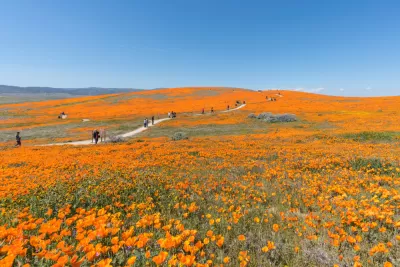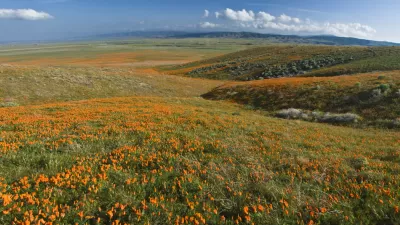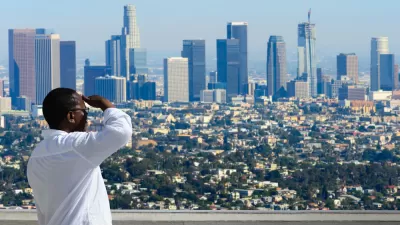The Los Angeles County Department of Parks and Recreation is doing a study to inventory and analyze the need for facilities like beaches, natural areas, open space, regional parks, trails, and local parks in rural areas.

What is the need for recreational assets like regional parks, beaches and trails in a county with over ten million residents? What are the potential opportunities to expand existing parklands and acquire additional land for recreation and conservation purposes? What are the unique park and recreation needs of rural areas and how do we best address them? In this article, park planner Clement Lau reports that the Los Angeles County Department of Parks and Recreation (DPR) is starting a community engagement and outreach process to help answer these questions and more. As a focused update to the 2016 Los Angeles Countywide Parks Needs Assessment, this effort is called the "Regional and Rural Edition." Specifically, the study will apply an equity lens to comprehensively identify, analyze, map, and document:
- The need for regional facilities, including regional parks, beaches and lakes, trails, and natural areas and open spaces
- The park needs of rural communities which are primarily located in the Antelope Valley, Santa Clarita Valley, and Santa Monica Mountains
Designed to be extensive and inclusive, the community engagement and outreach process is being launched this month in partnership with county departments, community-based organizations, and other groups. Due to COVID-19-related health restrictions on in-person meetings and group gatherings, the process will consist primarily of online engagement and physically distanced activities, including the following:
- Project website updates
- Surveys/polls using tools like Maptionnaire
- Social media, including platforms such as Instagram, Facebook, and Twitter
- Stakeholder interviews
- Phone calls
- Focus groups
- Workshops
- Webinars
DPR has also convened a Technical Advisory Committee (TAC) to help inform and guide the process of data collection and analysis, development of metrics, community engagement and outreach, and other key aspects of the project. The TAC includes representatives from a broad range of agencies and organizations with expertise in beaches, parks, public health, regional planning, transportation, open space and conservation, sustainability, and geographic information systems (GIS).
DPR is the lead agency charged with updates and implementation of the Countywide Parks Needs Assessment. The 2016 Parks Needs Assessment involved a 14-month process that included data collection and analysis, engagement with stakeholders and community members in cities and unincorporated areas, prioritization and cost estimation of prioritized park projects, and the determination of park need in each study area based on a suite of metrics. The Parks Needs Assessment directly informed the development of Measure A, a countywide funding measure for parks approved by nearly 75 percent of L.A. County voters in November 2016 and generates more than $90 million annually.
FULL STORY: Conducting a Regional and Rural Parks Needs Assessment

Study: Maui’s Plan to Convert Vacation Rentals to Long-Term Housing Could Cause Nearly $1 Billion Economic Loss
The plan would reduce visitor accommodation by 25,% resulting in 1,900 jobs lost.

North Texas Transit Leaders Tout Benefits of TOD for Growing Region
At a summit focused on transit-oriented development, policymakers discussed how North Texas’ expanded light rail system can serve as a tool for economic growth.

Using Old Oil and Gas Wells for Green Energy Storage
Penn State researchers have found that repurposing abandoned oil and gas wells for geothermal-assisted compressed-air energy storage can boost efficiency, reduce environmental risks, and support clean energy and job transitions.

Private Donations Propel Early Restoration of Palisades Playground
Los Angeles has secured over $1.3 million in private funding to restore the Pacific Palisades playground months ahead of schedule, creating a modern, accessible space that supports community healing after recent wildfires.

From Blight to Benefit: Early Results From California’s Equitable Cleanup Program
The Equitable Community Revitalization Grant (ECRG) program is reshaping brownfield redevelopment by prioritizing projects in low-income and environmental justice communities, emphasizing equity, transparency, and community benefits.

Planting Relief: Tackling Las Vegas Heat One Tree at a Time
Nevada Plants, a Las Vegas-based nonprofit, is combating the city’s extreme urban heat by giving away trees to residents in underserved neighborhoods, promoting shade, sustainability, and community health.
Urban Design for Planners 1: Software Tools
This six-course series explores essential urban design concepts using open source software and equips planners with the tools they need to participate fully in the urban design process.
Planning for Universal Design
Learn the tools for implementing Universal Design in planning regulations.
Ascent Environmental
Borough of Carlisle
Institute for Housing and Urban Development Studies (IHS)
City of Grandview
Harvard GSD Executive Education
Toledo-Lucas County Plan Commissions
Salt Lake City
NYU Wagner Graduate School of Public Service





























